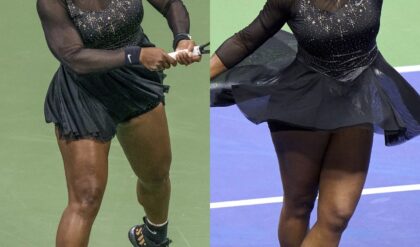The first transgender Paralympian has issued a defiant statement about inclusion and being a ‘role model’ ahead of competing at Paris 2024.
Visually impaired athlete Valentina Petrillo will represent Italy in the women’s T12 200m and 400m sprints, having claimed bronze at the World Para Athletics Championships in 2023.
Petrillo was born male with the name Fabrizio and transitioned in 2019 after undergoing hormone therapy. The 50-year-old was also born with Stargardt disease, a degenerative eye condition that has no cure.
Rival German Paralympian Katrin Mueller-Rottgardt fears Petrillo has an ‘advantage’ in the 200m while one Spanish lawyer called the Italian’s qualification ‘unfair’.
Despite the controversy, Petrillo is upbeat for the impending Games and wants to use them as an opportunity to teach people about inclusivity.

Valentina Petrillo, the first transgender Paralympian, is confident of being an ‘inspiring role model’ and predicts lots of ‘love’ from the crowd

The sprinter is due to compete in the women’s T12 200m and 400m in Paris, having been born male and previously been called Fabrizio

Visually impaired German sprinter Katrin Mueller-Rottgardt, 42, worries that Petrillo, 50, ‘could have an advantage’ because ‘she has lived and trained as a man for a long time’
‘Honestly, I can’t wait to be in Paris and race on that beautiful purple track and in front of all that enthusiastic crowd. I think there will be a lot more love for me than I can imagine,’ Petrillo said, via Relevo.
‘It’s only fair that each of us can express ourselves in our own gender. Sport should teach us the value of inclusion and this is fundamental for people’s happiness.
‘I have learned to let go of what I cannot control. I am now psychologically stronger than I was some time ago and this is also due to the support of my psychologist. People always criticise, for whatever reason, and that is why in my case they are even more likely to do so.
‘I gradually understood that you have to live with people’s envy and jealousy. unfortunately, but for my part I am aware that what I do is real and therefore I have nothing to fear.
‘I can win a medal, but I have to do better than my personal best from last year (58.011), because the level has increased.
‘I am absolutely aware of the social and cultural value of my presence in Paris 2024. I will do everything possible to rise to the occasion and achieve a sporting result of a certain competitive value.
‘There is a community that supports me and looks up to me, but even those who are not from the LGTBIQ+ world encourage me, because they see me as an inspiring role model and this for me is the most beautiful thing.’
The sprinter’s participation has sparked controversy and debate following the gender row involving Imane Khelif and Lin Yu-ting that engulfed the Olympics.

Petrillo was born with Stargardt disease, a degenerative eye condition that has no cure

It comes after the boxing gender row that has revolved around women’s boxing at the Olympic Games over the past few weeks, with Imane Khelif (pictured) and Lin Yu-ting winning gold

Petrillo won a bronze medal at the World Para Athletics Championships in 2023
Despite being disqualified from competing at the World Championships for failing a gender test, both Khelif and Yu-ting insisted that they were born female and had never identified any differently, each going on to claim triumphant gold medals in their respective weight classes.
Rival 200m athlete Katrin Mueller-Rottgardt worries about the advantage Petrillo could have.
What are the rules on trans Athletes competing at the Paralympics?
Under Rule 4.5 of World Para Athletics’ rules and regulations, the governing body states that athletes who are legally recognised as women are eligible to compete in female disciplines.
The regulation adds: ‘World Para Athletics will deal with any cases involving transgender athletes in accordance with the International Olympic Committee’s transgender guidelines.’
That policy differs from World Athletics’ stance, however, who banned transgender athletes from competing in women’s events in March 2023.
Lord Sebastian Coe, the president of World Athletics, stated that the decision was take to ensure fairness and ‘protect the female category’.
‘Basically, everyone should live in everyday life the way they feel comfortable,’ she began in an interview with Bild. ‘But I find it difficult in competitive sports.
‘She (Petrillo) has lived and trained as a man for a long time, so there is a possibility that the physical requirements are different to those of someone who was born a woman. This could give her an advantage.’
Mail Sport understands that Petrillo had previously competed in men’s national races before transitioning in 2019, winning 11 national titles in the men’s T12 category.
Under Rule 4.5 of World Para Athletics’ rules and regulations, the governing body states that athletes who are legally recognised as a women are eligible to compete in female disciplines.
The regulation adds: ‘World Para Athletics will deal with any cases involving transgender athletes in accordance with the International Olympic Committee’s transgender guidelines.’
That policy differs from World Athletics’ stance, who banned transgender athletes from competing in women’s events in March 2023.
Lord Sebastian Coe, the organisation’s president, stated that the decision was taken to ensure fairness and ‘protect the female category’.
During 200m qualifying, Petrillo finished ahead of Melani Berges, 33, meaning the Spaniard lost out on a Paralympic place in that event. While Berges has managed to qualify for the 100m, it sparked rage in Spain.
‘Our Spanish athlete Melani Berges has lost the chance to qualify for the Paralympics. The reason is the participation of the man Fabrizio ‘Valentina’ Petrillo, who made it to the final instead of her. That is unfair,’ said lawyer Irene Aguiar, who specialises in international sports law.
A report from Bild has claimed that 40 feminist organisations protested against the decision.

Petrillo’s first in action of the Paralympics comes the T12 women’s 400m event on September 2

Spanish lawyer Irene Aguiar (pictured) claims it is ‘unfair’ that Petrillo qualified for one event ahead of a Spanish athlete


Petrillo reached the semi-finals of 200m qualifying ahead of blind Spanish sprinter Melani Berges, who finished fifth and lost out – though she will still compete in the 100m
A letter from the organisation Alliance Against the Erasure of Women read: ‘Various national and international women’s associations, consortia and NGOs have approached the Spanish Paralympic Committee to contest Petrillo’s place on the grounds that he competed with an advantage in a category that did not correspond to his own, and to claim that place for the Spanish athlete Berges.’
International Paralympic Committee (IPC) president, Andrew Parsons, told BBC Sport that Petrillo would be ‘welcome’ at the upcoming games. But he also hoped that sporting bodies around the world could someday unite on their stance on the participation of transgender athletes.
‘I am prepared for the criticism,’ he said when asked by BBC Sport whether he was ready for any possible criticism he may receive in relation to Petrillo’s inclusion.
Asked whether he was prepared for any possible criticism he may receive in relation to Petrillo’s inclusion he added: ‘I am prepared for the criticism.’
‘But again we need to respect our rules, we cannot disrespect our rules. So sometimes as an individual, I think one way or another, but we need to follow our constitution, we need to follow our own rules and in specific sports, the rules of the international federations need to be respected.
‘I think it is just fair that we treat [transgender athletes] respectfully. But I do think science should give us the answer because we also want to be fair with the other athletes in the field of play.
‘It is a very difficult question. And science hopefully will be able to give us the answer. And what I would like to see in the future is that the whole of sport has a united position on it.’
Petrillo was born with Stargardt disease, a rare degenerative eye condition where tissue develops on the small part of a person’s retina that is used for sharp vision.

Visually impaired Italian sprinter, Petrillo, 50, is set to become the first-ever transgender athlete to compete at the Paralympic Games

Sebastian Coe has vowed to ‘protect the women’s category amid his push to be IOC president
Common symptoms include a gradual loss of eye sight and the illness is believed to be caused by changes in a person’s genes. There is no known cure for the illness.
Thanking organisers for being selected, Petrillo told BBC Sport: ‘I have been waiting for this day for three years and in these past three years I have done everything possible to earn it.
‘I deserve this selection and I want to thank the Italian Paralympic Federation and the Italian Paralympic Committee for having always believed in me, above all as a person as well as an athlete.
‘The historic value of being the first transgender woman to compete at the Paralympics is an important symbol of inclusion.’
Petrillo’s wife has remained supportive after finding out in 2017 that the Italian was transgender and would later start hormone treatment. They remain married and have two children.
The sprinter said: ‘I hadn’t planned it. I was in bed with my wife, about to fall asleep, and I said: ‘Remember I told you once I dressed up as a woman?’ She said: ‘ In reality, it wasn’t once, I do it every day.”
Petrillo went on to compete as a transgender athlete at the Italian Paralympics Championship in September 2020 and there won gold in the T12 100m, 200m and 400m events.
When Petrillo won bronze at last year’s World Para Athletics Championships, a former Canadian Olympic head coach called it ‘shocking’. British marathon runner Mara Yamauchi said to The Telegraph: ‘How many 49-year-olds would win medals at world level?’





